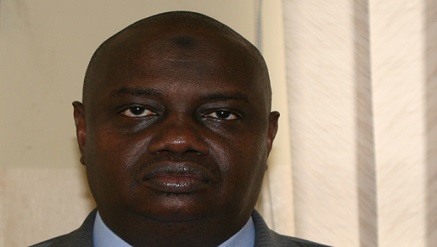News
Prolonged Battle against Cybercrime
Cybercrime is an image nightmare for Nigeria. Cybercrime is any illegal activity that uses a computer as its primary means and also includes any illegal activity that uses a computer for the storage of evidence.
Cybercrimes include crimes that have been made possible by computers, such as network intrusions and the dissemination of computer viruses, as well as computer-based variations of existing crimes, such as identity theft, stalking, bullying and terrorism.
But in Nigeria, the most common ones are: identity theft, desktop counterfeiting, cyber harassment and fraudulent electronic mails.
There are also Automated Teller Machine spoofing, pornography, piracy, hacking, phishing and spamming all conspiring to the notoriety of Nigeria as sanctuary for internet fraudsters.
The exceptional outbreak of cybercrimes in Nigeria is alarming, and the impact on the country’s socio-economy is damning.
That is why, the recently passed cybercrime bill by the Senate, which is now awaiting presidential endorsement is a welcome development.
It is victory of 10 years of efforts for a framework to safeguard the nation’s presence in cyberspace while ensuring protection of critical national information infrastructure.
The cybercrime bill, which was sponsored by Senator Adegbenga Kaka, representing Ogun East Senatorial Zone, among other things, stipulates a seven-year jail term for all kinds of computer-related frauds, computer-related forgery, offences relating to pornography, cyber-stalking and cyber-squatting.
The seven-year jail term was contained in a bill for an Act to provide for the prohibition, prevention, detection, response, investigation and prosecution of cybercrimes and for other related matters 2014.
The bill also seeks to punish interception of data, system interference and misuse of devices, and to promote cyber security, protection of computer systems and networks, electronic communications, data and computer programmes, intellectual property and privacy rights.
Also, anyone found guilty of possessing a manipulative device, unauthorised ATM card, damaging a computer with the intention to defraud, trafficking in any password to defraud customers or financial institutions would be sentenced to seven years imprisonment or a N7 million fine.
When the bill is signed into law, government must create lines of duty to avoid supremacy disagreements among law enforcement, intelligence and security agencies.
Also knowledgeable and committed champions who must stay ahead of criminals should be put in charge of cybercrime administration.
For the law succeed, there is also need for the enactment of substantive laws to criminalize malevolent activities on the internet; capacity building; cooperation between actors (Private or Public); establishment of Institutional framework for coordinating cybersecurity efforts; enactment of related Bills to strengthen the cybersecurity framework.
News
TCN Reveals N8.8 Billion Expenditure on Restoring Destroyed Transmission Towers
Federal Government has revealed that N8.8 billion has been spent to repair and restore power transmission towers across Nigeria that were destroyed by vandals and bandits.

The announcement was made on Wednesday by the Managing Director of the Transmission Company of Nigeria (TCN), Engr. Suleiman Ahmed Abdulaziz, during the Quarterly Power Sector Working Group meeting in Abuja.
Engr. Abdulaziz, represented by the Executive Director of Transmission Service Provider (TSO), Engr. Olugbenga Emmanuel Ajiboye, disclosed that 128 transmission towers have been destroyed since January 13, 2024. He lamented the recurrence of vandalism despite the arrests of perpetrators, citing ineffective prosecution as a significant challenge.
“Till date, we have spent about N8.8 billion, by our estimation, to put them back to full and functional use,” Abdulaziz said. “It is so sad that each time the vandals were caught and taken to police for prosecution, police would incident them for theft instead of vandalism, and they will be bailed. If they are charged for vandalism, they cannot be bailed, but this is where we are.”
Highlighting the severity of the situation, Abdulaziz noted the challenges faced during the restoration of the Shiroro-Mando-Kaduna transmission towers. “We had to get full military escorts for our contractors to restore the transmission lines and towers.
“In some cases, they would only allow us to work for two hours a day, and at times, they declared the area unsafe for operations.
“How can we deliver electricity to Nigerians under these terrible circumstances?”
The Minister of Power, Chief Adebayo Adelabu, represented by his Chief Technical Adviser, Mr. Adedayo Olowoniyi, outlined the government’s plans to collaborate with international partners to improve electricity access.
He revealed ongoing efforts with the World Bank and the African Development Bank (AfDB) to provide electricity to 50 million Nigerians by 2030 as part of the larger “Mission 300” initiative, which aims to bring electricity to 300 million Africans.
“Nigeria has a large population that is without electricity, and this is a great opportunity for us to be part of this process,” Adelabu said.
He added that the government’s strategy involves public and private sector partnerships focusing on solar systems, mini and micro grids, and grid extensions.
The Minister also announced that President Bola Ahmed Tinubu is set to sign the Compact document for the Mission 300 project in Tanzania in January 2025. “The most important thing is that we have to drive the process by ourselves,” he emphasized.
The Nigerian power sector continues to grapple with numerous challenges, including vandalism, banditry, and insufficient infrastructure. The Federal Government has also faced criticism for inadequate security measures around critical power assets.
News
Asein, DG NCC Seeks IP Policy for Every University
Dr. John O. Asein, the Director-General, Nigerian Copyright Commission (NCC) has again stressed the need for every University to have an Intellectual Property (IP) Policy so as to maximize their innovative and creative potentials.

Dr. Asein made this point while formally presenting the revised Model Intellectual Property (IP) Policy to the General Assembly of the Committee of Vice Chancellors of Nigerian Universities (CVCNU) in Abuja on 30th October 2024.
According to him, the Model Policy, which was developed by the Commission in collaboration with the CVCNU in 2021 was reissued as part of the Commission’s renewed effort to promote its adoption and implementation.
The Director-General thanked the immediate past Secretary General of CVCNU Prof. Yakubu Ochefu for supporting the initiative and working with the Commission to promote the sustainable use and effective management of IP in Nigerian universities.
Dr. Asein also called on tertiary institutions, as centres of learning and research, to introduce their faculties and students to the subject of intellectual property in line with global trends and to make Nigerian universities globally competitive.
To this end he assured Vice-Chancellors of the Commission’s readiness to help in the development and implementation of their policy.
“The Commission will work with other agencies, including the World Intellectual Property Organization (WIPO) to begin the intellectual property ranking of universities and celebrate those that excel in the respect, generation, use and commercilaisation of IP”, the Director-General assured.
Speaking on the WIPO Distance Learning (DL) courses on IP, the Director-General urged universities to infuse the WIPO DL 101 course, which is available online for free, into the General Studies course to give students basic knowledge of IP and equip them in their respective courses of study.
Receiving the copies on behalf of Nigerian Vice-Chcnellors, the Chairman CVCNU, Prof. Lilian Salami (Vice-Chancellor, University of Benin) commended the collaborative efforts of the Commission and AVCNU in developing the Model IP Policy and assured the Director-General of CVCNU’s continued commitment to working with the Commission, particularly in promoting better IP culture in universities.
The Model IP Policy was developed with the help of a team of Nigerian experts and with the support of the Nigerian University Commission (NUC), the World Intellectual Property Organization (WIPO) and the National Office of Technology Acquisition and Promotion (NOTAP).
News
Court Orders Arrest of Echefu, Businessman over Alleged $651,280 Fraud
A Chief Magistrate Court sitting in Bwari area council, Abuja has ordered the arrest of Dr Bright Echefu, chief executive of Briech Intelligence Fusion Limited, a security company, over an allegation of $651, 280 fraud.

Echefu is said to have allegedly defrauded BCG NEEDS Company of the said amount under the pretence of supplying drones and accessories.
The court ordered Disu Olatunji, commissioner of Police, federal capital territory (FCT) to arrest Echefu and his company.
Echefu is also the managing director and chief executive officer of Telecom Satellite Television, according to Leadership Newspaper.
The Economic and Financial Crimes Commission (EFCC) had earlier arraigned the businessman at the federal high court over allegations of tax evasion, money laundering, and advanced fee fraud.
Okechikwu John Akweke, presiding judge, ordered Echefu’s arrest after the motion was moved by John Paul Eze Esq. of O. J. Law Consult.
Akweke said the order is to compel Echefu and his company appearances before the court in line with Section 113 of the Administration of Criminal Justice Act 2015.

 E-Business2 days ago
E-Business2 days agoNITDA Alerts Nigerians on Cybersecurity Risks Linked to Spotify

 Uncategorized3 days ago
Uncategorized3 days agoNigerians to Use NIN Cards for Payments, Cash Withdrawals — NIMC

 News3 days ago
News3 days agoCourt Orders Arrest of Echefu, Businessman over Alleged $651,280 Fraud

 Telecom23 hours ago
Telecom23 hours agoGoogle, Meta Criticize Australia’s Rush to Pass Social Media Ban for Under-16s

 Telecom3 days ago
Telecom3 days agoGSMA Report Reveals How Cybersecurity and Revenue Growth are Driving Enterprise Digital Transformation

 Telecom2 days ago
Telecom2 days agoFG Plans Four New Satellites as Part of Tinubu’s Renewed Hope Agenda

 Telecom2 days ago
Telecom2 days agoMTN Nigeria Shops for N50Bn Commercial Paper to Boost Working Capital

 News2 days ago
News2 days agoAsein, DG NCC Seeks IP Policy for Every University

























